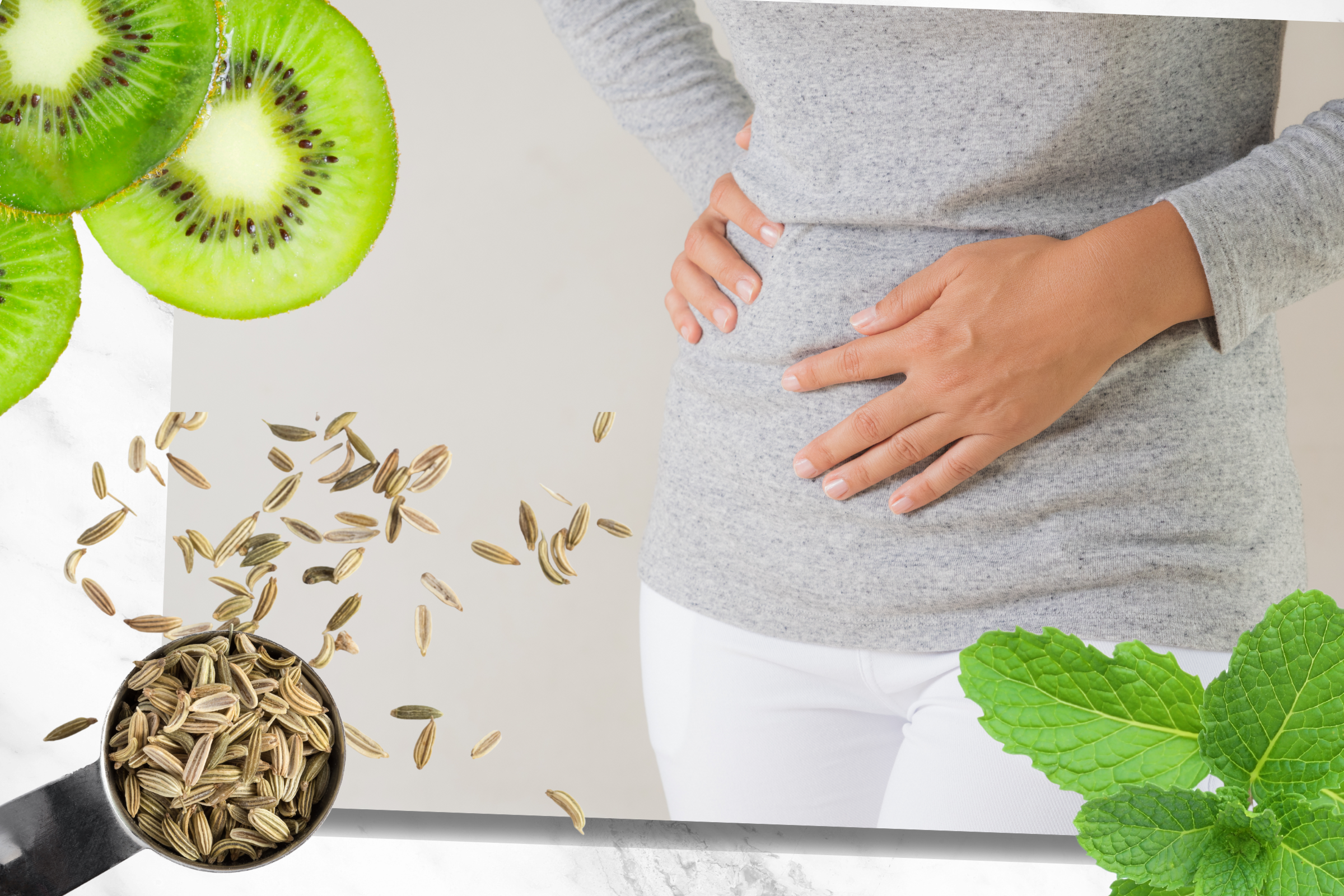8 foods to help beat bloating for a flatter tum

Many of us experience bloating during menopause, with hormonal changes, anxiety, and constipation all contributing to that balloon-like feeling.
Menopause can also bring about changes to our gut microbiome, leading to a decrease in our gut bacteria diversity, which, in turn, can make it more difficult for the body to digest food.
Making positive changes
“When the gut is out of balance – i.e. there are more non-beneficial bacteria than beneficial – the non-beneficial feed on sugar and produce gases, which can cause bloating,” says Jackie Morrell, a registered nutritional therapist and coach.
But it’s not all bad news. By making a few tweaks to our diet, we can support a happier tum and smoother digestion.
“Certain foods and drinks can contribute to bloating,” states Priya Tew, a specialist dietitian from Dietitian UK. She explains that common culprits include beans and lentils, cruciferous vegetables, high FODMAP foods (such as onions, garlic, and honey), and carbonated drinks.
Priya also explains that it’s not just what we eat, but how. Eating too fast and not chewing food properly can further contribute to a gas-filled stomach.
8 of the best foods to reduce bloating
Tackling bloating isn’t only about ditching particular foods or habits. It also involves adding certain foods into our diet – with some known to aid digestion and reduce gut inflammation.
Here, the experts share the bloat-busting staples that need to be in our kitchen.
Peppermint
This ingredient is an essential for beating the bloat, says Marcelle Rose, nutritionist and author of The Binge Freedom Method.
“The menthol it contains helps relax muscles in the digestive tract, which can ease bloating and discomfort,” she explains.
Research also suggests that the oils in peppermint have an anti-inflammatory effect and can reduce spasms in the digestive tract.
“Sipping on peppermint tea after meals is a great way to support digestion,” shares Marcelle.
However, Marcelle adds that it’s best to avoid peppermint if you have a hiatal hernia or gastroesophageal reflux disease (GERD).
Fennel seeds
Although better known for adding flavour to dishes, fennel seeds can also help to reduce bloating.
“Fennel contains anethole, a compound that relaxes the digestive tract muscles, preventing gas build-up,” shares Nishtha Patel, a clinical nutritionist, functional medicine practitioner, and founder of The Gut Expert. “It also has carminative properties, meaning it helps expel excess gas from the gut.”
Plus, studies indicate that fennel seed extract can improve gut barrier function – with a weakened and inflamed intestinal barrier linked to IBS and associated symptoms (including bloating).
Nishtha suggests chewing half a teaspoon of fennel seeds after a meal for rapid relief from trapped wind, or drinking 1-2 cups of fennel tea each day to support ongoing gut health.
Ginger
Ginger tea is often recommended for tummy troubles, and for good reason.
“Gingerol, a natural component of ginger root, increases the rate at which food exits the stomach and continues along the digestive process,” reveals Jackie. “Ginger also has a carminative effect, which decreases pressure on the oesophageal sphincter – reducing cramping, acid reflux, and wind.”
While plenty of herbal tea brands offer ginger-filled teabags, Jackie says adding raw ginger to hot water has the same effect. However, speak to your doctor before consuming ginger if you’re taking medication for blood thinning, blood pressure, or diabetes.
Kiwi
Kiwi fruit may be small, but it can be mighty for tackling bloating.
“It has been shown to help digestive issues, including reducing abdominal discomfort and helping with constipation,” says Priya. She says the fruit’s high water content is thought to be behind these benefits.
“Eating two kiwi a day is the recommended amount,” Priya states. “Over a few days, you are likely to see improvements.”
Kefir and kimchi
These two powerhouse foods are packed with probiotics – live microorganisms that help to support a healthier microbiome. A small study of adults who consumed a kefir-based milk drink daily for eight weeks experienced significantly improved gut health – with reduced stomach bloating, stomach pain, and constipation.
Jackie suggests that daily consumption of about 180 ml of kefir drink or yoghurt is best to experience its benefits. “Chuckling Goat kefir is the best quality, but Biotiful (the plain one) is a good alternative,” she recommends.
And as for kimchi? “A recent study suggests that eight tablespoons a day might increase the variety of good bacteria,” Jackie notes. “This is a lot, so a couple of tablespoons [daily] will be beneficial over time.”
Bananas
A staple in the fruit bowl, bananas are also full of gut-friendly goodness.
“Bananas are high in potassium, which helps counteract bloating caused by sodium-induced water retention,” shares Nishtha. They’re also a great source of prebiotic fibre, she says – which feeds our beneficial gut bacteria and promotes better digestion. “Remember: the greener the banana, the more prebiotic fibre it has.”
A small study of women found that eating a banana twice a day as a pre-meal snack led to significantly lower levels of bloating. However, consuming half that amount could be enough to make a difference.
“Eating one small banana per day can help regulate water balance and improve gut function,” reveals Nishtha. But don’t expect immediate results: rather than providing instant bloating relief, the gut health benefits of bananas kick in more gradually.
Papaya
Marcelle says this tasty tropical fruit is packed with papain. “This is a natural enzyme that helps break down food and reduce bloating, especially if constipation is involved,” she says. Papain also has anti-inflammatory properties, which can help soothe the gut.
As if that wasn’t enough, the relatively high dietary fibre content of papaya (about 2.3g per 100g serving) may aid in reducing constipation and associated bloating.
“A few slices of fresh papaya in the morning, paired with porridge oats or natural yoghurt, can be a great way to incorporate it into your routine,” suggests Marcelle.
Further support
If you’re experiencing regular bloating, speak to your doctor about possible causes. While diet and eating habits can all play a role, something bigger may be going on – such as a food intolerance or digestive disorder – that needs treatment for symptoms to resolve.




